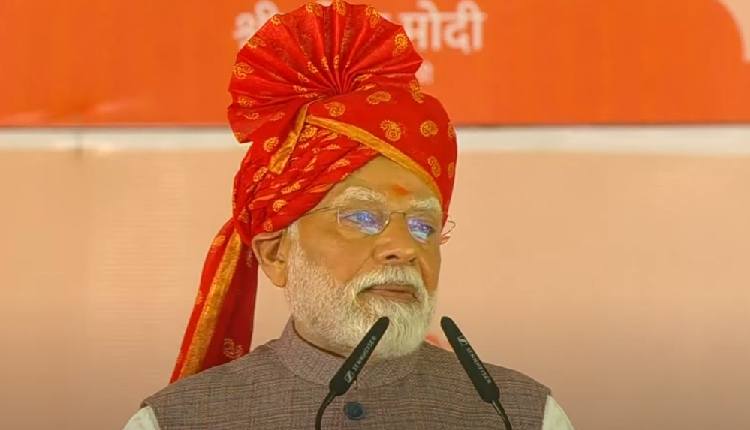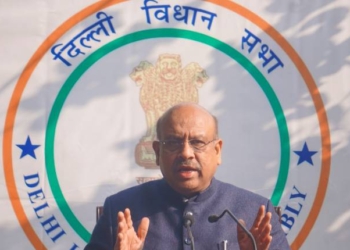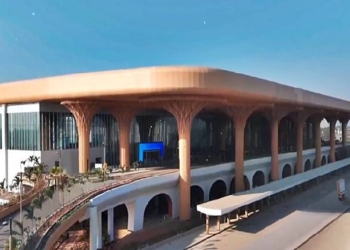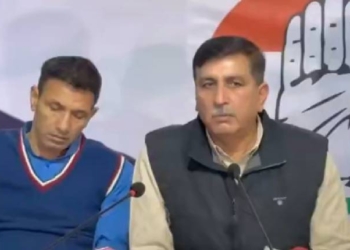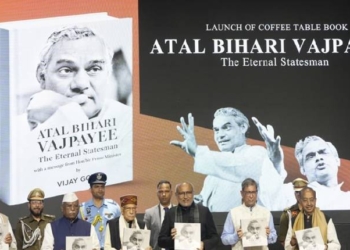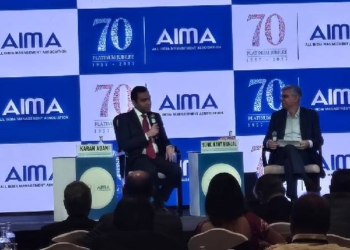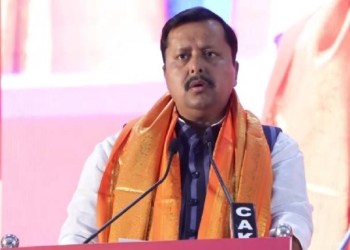Bikaner: Prime Minister Narendra Modi inaugurated and laid the foundation for several major development projects worth over Rs 26,000 crore in Rajasthan’s Bikaner on Thursday.
He also inaugurated 102 redeveloped railway stations across 86 districts in 18 states and Union Territories under the Amrit Bharat Station Scheme at a cost of approximately Rs 1,100 crore.
These include a mix of major and minor stations spread across Andhra Pradesh, Assam, Bihar, Chhattisgarh, Gujarat, Haryana, Himachal Pradesh, Jharkhand, Karnataka, Kerala, Madhya Pradesh, Maharashtra, Puducherry, Rajasthan, Tamil Nadu, Telangana, Uttar Pradesh, and West Bengal.
Addressing the public rally, PM Modi said, “Today, I came in front of you all after seeking the blessings of Karni Mata. Due to the blessings of Karni Mata, our resolution of Viksit Bharat is strengthening. Just a few minutes back, the inauguration and foundation stone of development projects worth Rs 26,000 crore were laid. I congratulate the people of Rajasthan for this.”
“To make a Viksit Bharat, today, an extensive campaign is ongoing to develop a modernised infrastructure in the country. To modernise the roads, highways, trains and railway stations, work has been done with an unprecedented pace in the last 11 years. Today, the amount spent by the nation on these infrastructural developments is six times what was used before,” he said.
“Today, even the world is surprised seeing the developmental works being carried out by India,” PM Modi said, giving examples of Chenab Bridge, Arunachal Pradesh’s Sela Tunnel, Mumbai’s Atal Setu and Pamban Bridge in South India.
The Prime Minister also said that today, India is “modernising” its train network by introducing trains like Vande Bharat, Amrit Bharat and Namo Bharat trains, which shows the “new pace and progress of the country’s technology.”
Earlier in the day, the Prime Minister also offered prayers at the sacred Karni Mata Temple, followed by a visit to the newly redeveloped Deshnoke railway station.
This station is one of the 103 stations revamped under the Amrit Bharat Station Scheme.
PM Modi also flagged off the new Bikaner-Mumbai Express train.
Under the Amrit Bharat Station Scheme, railway stations across the country are being upgraded to offer enhanced passenger facilities, accessibility for Divyangjan (persons with disabilities), and culturally rich designs.
A total of 103 stations, modernised for Rs 1,100 crore, were inaugurated by the Prime Minister. These include eight stations in Rajasthan — Fatehpur Shekhawati, Deshnok, Bundi, Mandalgarh, Gogamedi, Rajgarh, Govindgarh, and Mandawar-Mahua Road.
The Deshnoke station, in particular, has been designed to reflect local architectural traditions, including temple-style arches and decorative pillars.
As part of this vision, the Prime Minister laid the foundation for the 58 km Churu-Sadulpur rail line and dedicated the electrification of key railway sections, including Suratgarh-Phalodi (336 km), Phulera-Degana (109 km), Udaipur–Himmatnagar (210 km), Phalodi–Jaisalmer (157 km), and Samdari–Barmer (129 km).
In terms of road infrastructure, the Prime Minister launched projects aimed at both enhancing civilian connectivity and strengthening national security.
This includes laying the foundation for three vehicular underpasses on NH-58 in Pushkar, as well as the widening of NH-11 and NH-70.
Additionally, he dedicated seven major national highway projects worth Rs 4,850 crore, which are expected to improve military mobility and boost the regional economy.
The Prime Minister’s visit also emphasised India’s commitment to clean energy. He laid the foundation stone for several solar power initiatives, including a 300 MW ground-mounted solar project by NEEPCO in Bikaner and a 100 MW project by SJVN in Nawa.
Solar projects in Didwana and Kuchaman were also initiated. Transmission systems under Powergrid’s Sirohi and Mewar divisions were launched to enhance grid connectivity.
Furthermore, he inaugurated three key power infrastructure projects — Power Grid Neemuch Transmission System, a power evacuation project in Bikaner, and capacity expansion of the Fatehgarh-II Power Station.
Among other projects, the 500 MW Kalasar and 300 MW Shimbhu Ka Bhurj solar power plants will play a pivotal role in strengthening India’s renewable energy framework, supported by indigenous solar PV modules under the “Make in India” mission.
Strengthening regional connectivity further, the Prime Minister launched the upgradation and maintenance of 12 state highways covering 757 km under the Rajasthan State Highway Development Programme, with a total investment of Rs 3,240 crore.
Prominent routes include Mangaliyawas-Padukalan (State Highway-102), Beawar-Tehla-Alniyawas (SH-59 and SH-104), and Dantiwada-Pipar-Merta City (SH-21).
Plans are in place for the future upgradation of another 900 km of roadways, including the Gotan-Sathin Highway, linking industrial and border areas more efficiently.
To bolster the state’s healthcare infrastructure, the Prime Minister also inaugurated four new nursing colleges in Rajsamand, Pratapgarh, Bhilwara, and Dholpur.
These institutions will help strengthen the healthcare workforce and improve access to quality medical education across Rajasthan.
In addition, two electrical substations — 132 kV GSS Rajpura in Bikaner and 132 kV GSS Sarda in Udaipur — will be inaugurated to improve power distribution in the region.
These upgrades are a vital part of ensuring a stable and reliable energy supply across the state.
(IANS)




